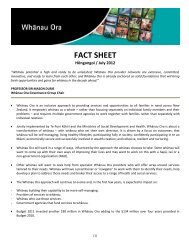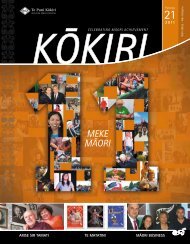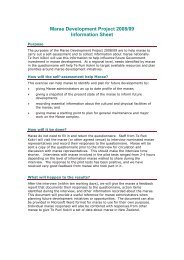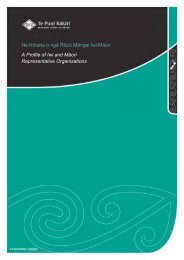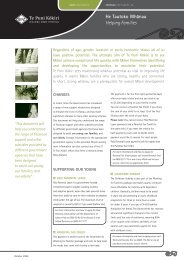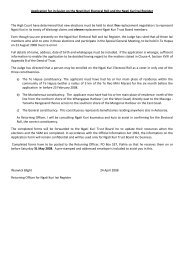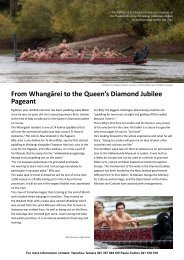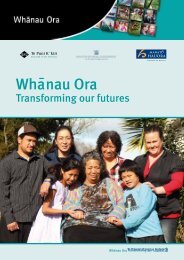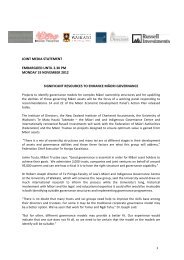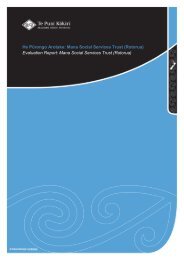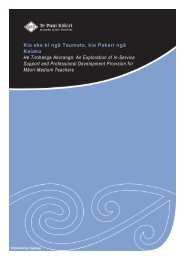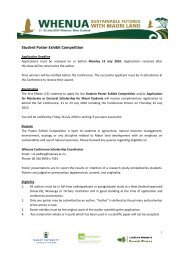Download the PDF (6.0MB) - Te Puni Kokiri
Download the PDF (6.0MB) - Te Puni Kokiri
Download the PDF (6.0MB) - Te Puni Kokiri
Create successful ePaper yourself
Turn your PDF publications into a flip-book with our unique Google optimized e-Paper software.
SUSTAINABLE KIDS<br />
PROGRAMME<br />
Promoting nutrition and physical activity in sustainable ways was <strong>the</strong><br />
focus of <strong>the</strong> Agencies for Nutrition Action Conference.<br />
Physical activity and nutrition<br />
experts from all over <strong>the</strong> country,<br />
as well as overseas experts,<br />
ga<strong>the</strong>red at <strong>the</strong> conference held<br />
in Wellington.<br />
The conference highlighted that<br />
many sectors are well placed to<br />
infl uence nutrition and physical<br />
activity including conservation,<br />
education, transport, recreation,<br />
social development and local<br />
government.<br />
Shane Ngatai, principal of<br />
Rhode Street School in Dinsdale,<br />
Hamilton, showed conference<br />
delegates how <strong>the</strong> education<br />
sector could inspire healthy and<br />
sustainable living.<br />
The seeds of Rhode Street<br />
School’s Sustainable Kids<br />
Programme were planted late in<br />
2006 and have been fl ourishing<br />
ever since. What started off as a<br />
vegetable patch at Rhode Street<br />
School has grown into a wholeof-school<br />
project that keeps<br />
on expanding. Principal Shane<br />
Ngatai’s vision was to create a<br />
sustainable school environment.<br />
“The idea of <strong>the</strong> programme<br />
was always sustainable, healthy<br />
living and healthy attitudes. I<br />
wanted <strong>the</strong> school to become<br />
<strong>the</strong> basis for a sustainable<br />
community, and create resources<br />
to do that. Not an easy task in<br />
an inner-city school,” says Shane<br />
Ngatai.<br />
“As a community we felt this<br />
generation of children had<br />
missed out on growing things<br />
for <strong>the</strong>mselves. Most children<br />
thought vegetables came from<br />
supermarkets and were eating too<br />
many processed foods. We knew<br />
it was part of our responsibility<br />
to teach <strong>the</strong>m <strong>the</strong> life skills <strong>the</strong>y<br />
need to stay healthy.”<br />
After receiving funding from <strong>the</strong><br />
Ministry of Social Development’s<br />
Extended Services Programme, in<br />
order to grow and process food at<br />
<strong>the</strong> school, <strong>the</strong> Sustainable Kids<br />
Programme came to life in 2008.<br />
“We now grow huge amounts of<br />
fruit and vegetables. We have a<br />
kitchen vegetable garden, two<br />
orchards and we’ve also created<br />
a hydroponics tunnel house that<br />
allows us to grow vegetables like<br />
tomatoes and lettuce in winter.<br />
Our student cafe produces healthy<br />
breakfasts and lunches – and<br />
almost all <strong>the</strong> ingredients are<br />
grown at <strong>the</strong> school. Every child<br />
from <strong>the</strong> age of 5 to 13 works<br />
in <strong>the</strong> kitchen during <strong>the</strong> school<br />
week,” says Shane Ngatai.<br />
The Sustainable Kids Programme<br />
has been so successful that it<br />
has extended into <strong>the</strong> wider<br />
community.<br />
The school plans to extend <strong>the</strong><br />
project even fur<strong>the</strong>r and Mr<br />
Ngatai is helping o<strong>the</strong>r schools to<br />
adopt similar programmes.<br />
RANGATAHI<br />
TE PUNI KÖKIRI | KÖKIRI | PIPIRI – HÖNGONGOI 2009<br />
47



